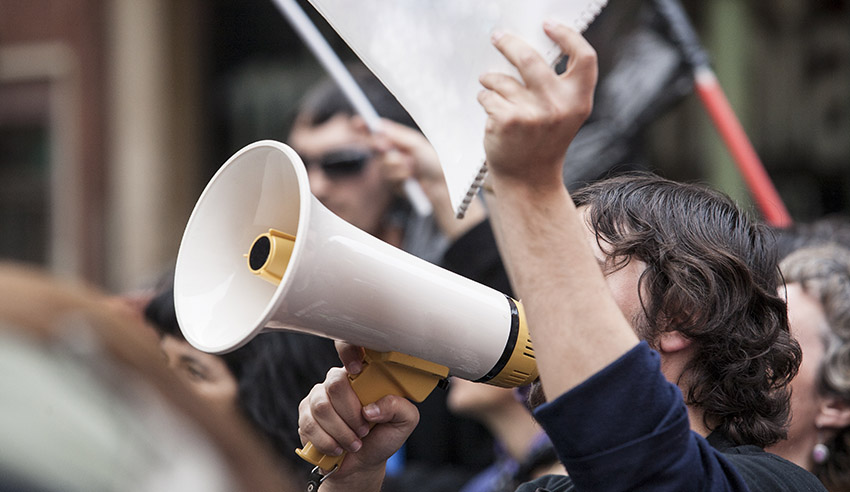A number of defence lawyers and legal bodies have criticised a new anti-protest law passed in NSW Parliament on Friday (1 April), calling them “poorly drafted”, an “outrage”, and a “dark day for democracy”.

The government legislation will prevent illegal protestors from causing disruption on prescribed major roads, bridges, tunnels, public transport and infrastructure facilities across the state.
“This bill strengthens the penalties that may be applied to people who participate in illegal protests where their actions cause serious disruption to our roads, public transport or major infrastructure,” he said.
“The existing section 144G of the Roads Act 1993 makes it an offence to enter, remain on, or otherwise trespass on prescribed major bridges or tunnels in NSW if that conduct causes a serious disruption. The bill expands this to prescribed roads. It also creates an equivalent offence under the Crimes Act 1900 so that activities that detrimentally affect prescribed public transport or infrastructure facilities can be captured.”
However, the Roads and Crimes Legislation Amendment Bill 2022 has been heavily criticised by the legal profession.
The Defence Lawyers of NSW president Emmanuel Kerkyasharian said that the organisation is “concerned that laws that fundamentally effect protest rights have been passed through Parliament with such haste, little debate and no consultation”.
“The laws themselves appear to be poorly drafted. It is the mark of a civilised community that it can accommodate peaceful protest,” he said.
Similarly, Human Rights Law Centre senior lawyer Kieran Pender said that the new legislation marked a “dark day for democracy in New South Wales”.
“Our freedom to come together and speak out on issues we care about is fundamental to democracy. From Aboriginal land rights to voting rights to the eight-hour work day – protest has been crucial to achieving countless important social changes,” he said.
“This draconian new law is part of an alarming national trend towards restricting peaceful protest rights in Australia and it must be repealed at the earliest opportunity.”
The law was pushed through in less than a week and carries a new maximum penalty of $22,000 or two years in jail, or both.
NSW Council for Civil Liberties president Pauline Wright called these penalties shocking in the current climate.
“It’s shocking that a law threatening peaceful protesters with significant fines has been passed in Australia in 2022. In a liberal democracy, the government should welcome citizens expressing their views, not try to ban it,” she said.
“This law is an outrage, but it isn’t the end of the road – we fought for protest rights in the 70s and won, and we’ll do the same now.”
Partner at Jackson John Defence Lawyers Yashvi Shah added that whilst protestors should be penalised for disruptions, these new offences “carry far too hefty max penalties”.
However, the bill also has “severe implications for freedom of speech”, said Environmental Defenders Office chief executive David Morris.
“There is a real, palpable community concern about this new legislation, which seemingly is intended to limit the right to protest to circumstances where the state sanctions it,” he said.
“This law has implications far beyond the environmental protests occurring at this specific point in Australian history. It endangers the public’s ability to have their voice heard through public protest and demonstration, activities which are at the very heart of our democratic process.”
Lastly, Aboriginal Legal Service chairperson Mark Davies condemned the legislation and said the legal body would continue to fight for protest rights.
“The Aboriginal Legal Service was born out of a protest movement in the 1970s. You would be hard pressed to find any win for Aboriginal and Torres Strait Islander peoples’ rights that wasn’t brought about by public protest.
“The right to assemble and demonstrate in our streets, towns and cities is a fundamental cornerstone of democracy. For marginalised communities, public protests enable us to be seen and heard, even – and especially – when those in power would rather suppress our voices.
“We condemn in the strongest terms this government crackdown on our right to protest.”

Lauren is the commercial content writer within Momentum Media’s professional services suite, including Lawyers Weekly, Accountants Daily and HR Leader, focusing primarily on commercial and client content, features and ebooks. Prior to joining Lawyers Weekly, she worked as a trade journalist for media and travel industry publications. Born in England, Lauren enjoys trying new bars and restaurants, attending music festivals and travelling.